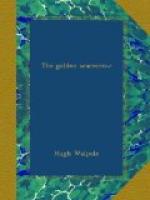“When I was a baby,” said Mr. Lasher, incredulously, as though that were a thing that he never possibly could have been, “my dear Pidgen!”
“Ah, you think it absurd,” said the other, a little cooler again. “But how do you know who watched over your early years and wanted you to be a dreamy, fairy tale kind of person instead of the cayenne pepper sort of man you are. There’s always some one there, I tell you, and you can have your choice, whether you’ll believe more than you see all your life or less than you see. Every baby knows about it; then, as they grow older, it fades and, with many people, goes altogether. He’s never left me, St. Christopher, you know, and that’s one thing. Of course, the ideal thing is somewhere between the two; recognise St. Christopher and see the real world as well. I’m afraid neither you nor I is the ideal man, Lasher. Why, I tell you, any baby of three knows more than you do! You’re proud of never seeing beyond your nose. I’m proud of never seeing my nose at all: we’re both wrong. But I am ready to admit your uses. You never will admit mine; and it isn’t any use your denying my Friend. He stayed with you a bit when you just arrived, but I expect he soon left you. You’re jolly glad he did.”
“My dear Pidgen,” said Mr. Lasher, “I haven’t understood a word.”
Pidgen shook his head. “You’re right. That’s just what’s the matter with me. I can’t even put what I see plainly.” He sighed deeply. “I’ve failed. There’s no doubt about it. But, although I know that, I’ve had a happy life. That’s the funny part of it. I’ve enjoyed it more than you ever will, Lasher. At least, I’m never lonely. I like my food, too, and one’s head’s always full of jolly ideas, if only they seemed jolly to other people.”
“Upon my word, Pidgen,” said Mr. Lasher. At this moment Mrs. Lasher opened the door.
“Well, well. Fancy! Sitting over the fire talking! Oh, you men! Tea! tea! Tea, Will! Fancy talking all the afternoon! Well!”
No one had noticed Hugh. He, however, had understood Mr. Pidgen better than Mr. Lasher did.
V
This conversation aroused in Hugh, for various reasons, the greatest possible excitement. He would have liked to have asked Mr. Pidgen many questions. Christmas Day came, and a beautiful day enthroned it: a pale blue sky, faint and clear, was a background to misty little clouds that hovered, then fled and disappeared, and from these flakes of snow fell now and then across the shining sunlight. Early in the winter afternoon a moon like an orange feather sailed into the sky as the lower stretches of blue changed into saffron and gold. Trees and hills and woods were crystal-clear, and shone with an intensity of outline as though their shapes had been cut by some giant knife against the background. Although there was no wind the air was so expectant that the ringing of church bells and the echo of voices came as though across still water. The colour of the sunlight was caught in the cups and runnels of the stiff frozen roads and a horse’s hoofs echoed, sharp and ringing, over fields and hedges. The ponds were silvered into a sheet of ice, so thin that the water showed dark beneath it. All the trees were rimmed with hoar-frost.




